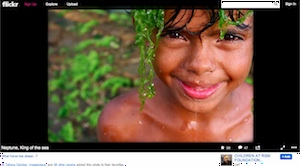Student steals photos to win international competitions and big prizes
posted Monday, September 23, 2013 at 12:45 PM EST

Image theft is hardly a new problem, and has been one of the biggest photographic issues of the digital age. But there's something especially distasteful about when it happens for a competition — and a Filipino student seems to have made something of a name for himself, doing it multiple times to win multiple prizes.
University of the Philippines graduate student Mark Joseph Solis entered a competition called "Smiles for the World," netting himself a $1000 prize, and a trip to Chile and Brazil, the top prize for the competition run by the Chilean ambassador. But it turns out the image wasn't his, and not only was this a stolen photo, but it wasn't the first time Solis had done this either.
In this case, the image originally was by Gregory J. Smith, the founder of the Children at Risk Foundation in Brazil, and posted to his Flickr account. When Smith came forward identifying the photo as his, that's when it came to light that Solis had done this multiple times before, often winning himself prizes along the way. Philippines newsite Rappler has identified at least five incidents of Solis committing plagiarism. And, while Solis has apologized, the Chilean Embassy has revoked his prize, and the University of Philippines where he attends is investigating his actions.
Solis' plagiarism seems to have become big news in the Philippines, with widespread coverage. But the fact that Solis did this so frequently speaks volume for just how easy it can be to cheat in competitions like this. We've seen multiple such instances of late that demonstrate it really doesn't take much work to pass off someone else's work as your own. You would assume that competitions would at least run highly ranked images through a reverse image search, or require high-resolution versions as some sort of proof of origin. But even then, small file sizes and obscure images would be enough to block such attempts.
What do our readers think? How can and should photography competitions ensure that all entries are original? Keep in mind, not everyone shoots Raw, or with a a high-resolution device. It would have to work as much for an iPhone camera as it would a DSLR.
(Via Reddit)